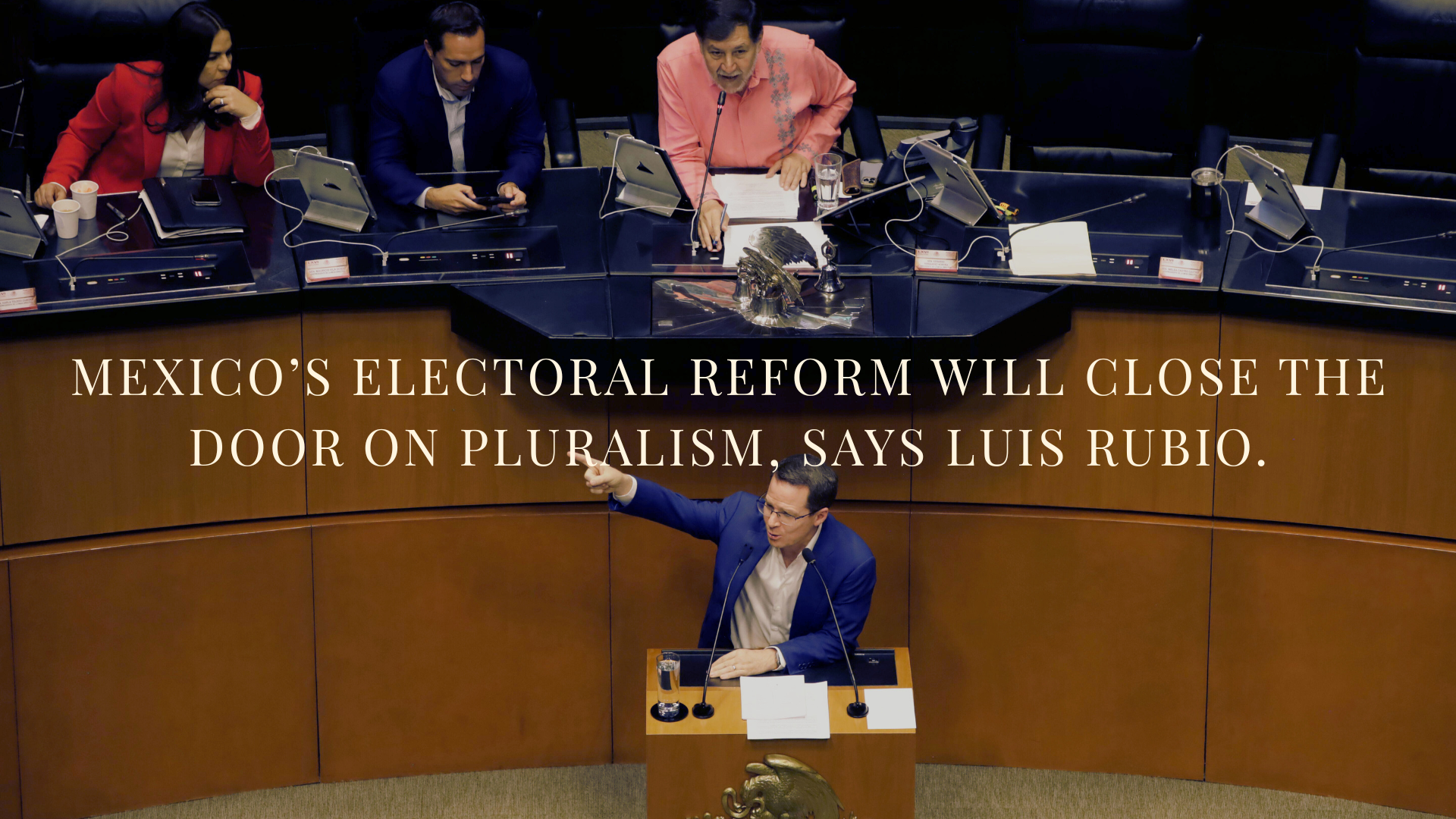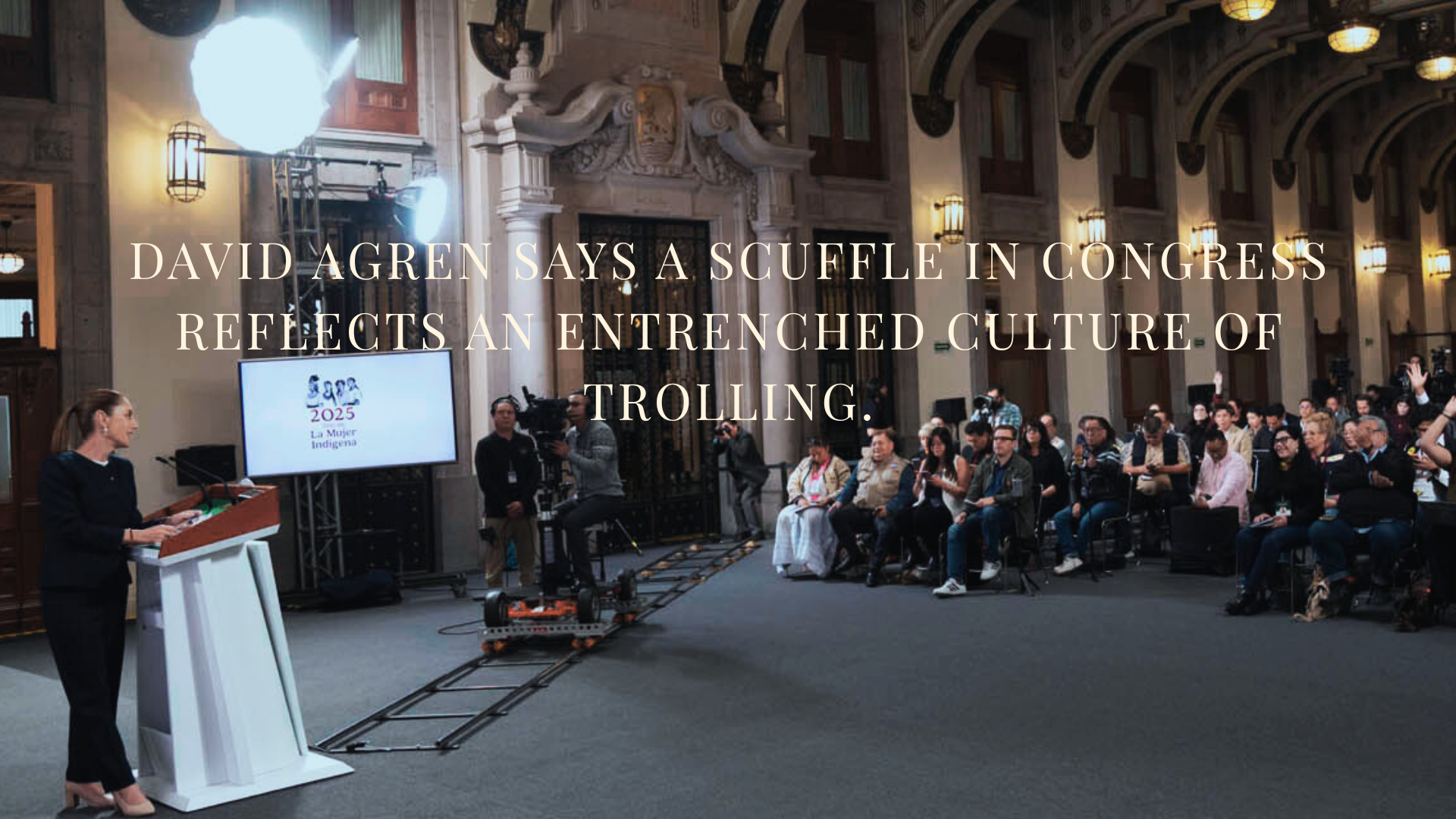
Mexico’s electoral reform will close the door on pluralism
by Luis Rubio, political analyst and Chair of México Evalúa.
President Claudia Sheinbaum has announced an electoral reform. Its details have not yet been made public, but its spirit has been clear since the beginning of the year, laid out through a series of official statements. What motivates this initiative is radically different from the logic that inspired every electoral (or political) reform since 1962, when Mexico introduced the figure of “party deputies” — in other words, opposition representatives — as a way to open space for diverse voices, oxygenate the system, and preserve political stability.
The central question is not what the reform will contain — its intent is already known — but how the two minor allies, the Green Party (PVEM) and the Labor Party (PT), will act. Without their support, passage is impossible.
From 1962 onward, every electoral reform pursued the same purpose: injecting oxygen into the political system. That was the rationale behind the 1978 reform engineered by Jesús Reyes Heroles, which gave legitimacy to left-wing parties such as the Communist Party and the Mexican Workers’ Party. Their numbers were negligible, but…


These are Mexico’s five new public security laws, and this is what they do
by Alexandra Helfgott.
President Claudia Sheinbaum has accelerated the momentum initiated by her predecessor to overhaul Mexico’s approach to public security. Her administration has pursued a strategic transformation of the country’s security framework. While these laws are framed as tools for enhancing transparency and accountability, critics argue they threaten the rule of law and civil liberties.
This shift began under President Andrés Manuel López Obrador (AMLO), who in 2019 created the National Guard, a civilian force meant to replace military deployments following the 2006 launch of the War on Drugs. AMLO and allies described the Guard as a temporary force crucial to restoring accountability in security efforts. However, the Guard’s role quickly expanded, taking over customs and border control, infrastructure projects like Tren Maya, and migration enforcement. It evolved into a central pillar of Mexico’s security strategy. Just before leaving office, Congress approved a constitutional reform placing the Guard under military control (Sedena), following a failed 2023 attempt blocked by the Supreme Court.
Less than a year into office, Sheinbaum has embraced continuity, introducing over 20 bills in an extraordinary congressional session. Several of these will significantly alter public security policy, sparking concerns about increasing surveillance and militarization.
These are the five new laws and reforms that will fundamentally transform Mexico’s national security approach…

Mexico’s government is using the disappeared to build a surveillance state, families say
by Madeleine Wattenbarger.
A polemical point of the reform to the General Disappearance Law passed by Mexican legislators this week is the use of a biometric CURP to search for missing people. The reform is part of a broad legislative package that includes a reform to the General Population Law, which establishes the use of a CURP with fingerprints and a photograph as an identification document obligatory for access to public and private services. The data will go into a Unified Identity Platform (PUI, by its initials in Spanish), which will, in theory, permit the authorities to locate missing people by their CURP.
A previous iteration of the biometric CURP proposal was backed by the World Bank, and similar initiatives were proposed by Felipe Calderón, Enrique Peña Nieto and former Secretary of the Interior Olga Sanchez Cordero. The reform comes out of a proposal presented by Claudia Sheinbaum on March 27, after disappearances in Mexico were thrown into the spotlight: search collectives found a ranch in Teuchitlán, Jalisco, where victims of forced recruitment were held, and the United Nations Committee on Forced Disappearance gave the official assessment that systematic state disappearances exist in Mexico.
After Sheinbaum presented the reform to the General Disappearance Law, the government held a series of feedback sessions with search collectives and victims’ families. Some of the families’ proposals appear in the revised law passed by the Senate. It will incorporate…

Mexico is paying a high price for its opposition parties’ malaise
by Gerónimo Gutíerrez.
Editor’s note: Amb. Gutíerrez served as Mexico’s Ambassador to the United States and also as Mexico’s Undersecretary for Governance.
Mexico’s political opposition today finds itself in a dire position. Since its founding in 2014, the ruling Morena Party has made extraordinary gains. It now holds the presidency, 23 of 32 governorships, comfortable majorities in the federal congress and 27 state legislatures, and, together with its allied parties (the Workers' Party, or PT, and the Green Party, or PVEM), has the power to enact laws and even amend the Constitution at will. President Sheinbaum enjoys exceptionally high approval ratings (around 70%), much like her predecessor, former President Andrés Manuel López Obrador, did.
In recent years, Morena-led governments have taken actions that appear to significantly weaken institutional checks and balances, the separation of powers, and democratic norms. To be sure, Morena and the President reject this characterization — but critics, both in Mexico and abroad, make a persuasive case. For example, the Global Democracy Index published by The Economist now classifies Mexico as a hybrid regime, no longer even a flawed democracy.
In the 2024 election, the traditional parties (PAN, PRI, and PRD) received only 27% of the presidential vote, compared to the 60% won by Claudia Sheinbaum. Currently, the PAN governs just four states, the PRI only two, and both hold modest parliamentary groups in Congress. The PRD no longer exists. Movimiento Ciudadano (MC) appears to be the emerging party. It secured a significant 10% of the presidential vote in the last election and currently governs two states. However, it is hampered by internal inconsistencies and scandals, which raise serious doubts about its long-term potential.
Under these circumstances, it is only natural to ask whether the political opposition has pursued the right strategy to counter Morena’s rise — and if not, what that strategy could look like in the future. There are no easy answers, but perhaps a few sensible working hypotheses.
In a country where 43% of the 128 million population lives in poverty (according to 2022 official figures), machine politics work. The Morena governments have built a vast platform of social programs, including direct cash transfers that reach an estimated 25 million households. Opposition parties have wavered between timidly supporting these programs and criticizing their effectiveness, political bias, and fiscal sustainability. Unless they can clearly articulate where they stand…

Mexico’s new security laws expand military power and erode civilian oversight
The final stage of the National Guard’s militarization is now underway.
In September 2024, former President López Obrador amended the Constitution to formally place the National Guard—already operating in practice as a military force—under the control of the Ministry of Defense. Last week, Congress convened an extraordinary session to approve legal reforms introduced by President Claudia Sheinbaum. These reforms aim to align at least nine existing laws with the 2024 constitutional amendment and complete the transformation of the National Guard into the fourth branch of the armed forces. These secondary laws mark the culmination of the process initiated by López Obrador and underscore that Morena’s priorities remain unchanged.
Throughout its electoral victories, Morena has made clear its conviction that the military should play a prevalent role in public life. The secondary legislation has further entrenched this vision, and the concern lies not merely in the specific laws being passed, but in the broader ambition to forge a new political regime defined by the primacy of military authority. In liberal democracies, the military sphere is deliberately constrained; in illiberal regimes, it is expanded.
Before the 2024 reform, the Constitution stated that in times of peace, the military could not perform any activities other than those strictly related to military discipline. The constitutional reform changed this, allowing the armed forces to carry out any function established by secondary law. This is a significant shift which opens up many new possibilities for what the armed forces are allowed to do.
For example, the amendments submitted to the legislature expand the powers of this body, authorizing it, among other things, to intercept private communications and carry out undercover operations. This move comes alongside…

New rules: The 4T ushers in a new age of peak power
by David Agren.
Former PRI governor Fidel Herrera passed away recently. He was remembered for a sordid administration in the late 2000s, when Los Zetas took over the state. As the discovery of a clandestine refinery in Veracruz revealed, the state-crime nexus continues – even with Morena in power since 2018, having ousted Herrera’s Institutional Revolutionary Party.
Herrera scandalized Mexico throughout his term. He won the lottery twice while in office. And he coined the trademark phrase: “Estoy ahorita en plenitud del pinche poder” – roughly translated as “I’m at the height of my f*cking power.” A less polite translation would be a confession to being drunk with power.
The line encapsulated the impunity and abuse of authority during his term in Veracruz, which was followed by the thievery of fellow príista Javier Duarte – under whom Veracruz became a cemetery for journalists.
Morena and its allies in the so-called “Fourth Transformation” (4T) have channeled Herrera’s authoritarianism in recent weeks – even longer, according to critics – as they push as a series of reforms through congress, where they hold constitutional-proof majorities.
The 16 reforms range from changing wildlife laws to ban the use of captive marine mammals in theme parks to building platforms for boosting state surveillance capacities and a measure to allow National Guard members to seek public office (despite being under National Defence Secretariat command.)

Fernández Noroña: the chaos agent in charge of Mexico’s Senate
by David Agren.
Senate President Gerardo Fernández Noroña pulled up to a party event last Sunday in a swank SUV. The Institutional Revolutionary Party took notice.
“.@fernandeznorona talks like he was part of the people, acts like an authoritarian … but he loves living like a fifí.”
Fernández Noroña predictably exploded, unloading on the PRI with a hyperbolic tirade.
He called them, “A bunch of thieves,” then defended himself saying, “Everything I have I’ve earned through my work and effort. Not like you.” He continued with the usual righteous line that politicians in the ruling coalition take with their opponents, accusing the PRI of having “plundered the country,” and branding them, “Repressors, plunderers, and frauds, as well as traitors to the nation. And that’s putting it mildly.”
Fernández Noroña is what the Canadians might call a “shit disturber” – a person who has long caused mischief in Mexican politics and whose reputation for picking fights and flouting norms precedes him.




